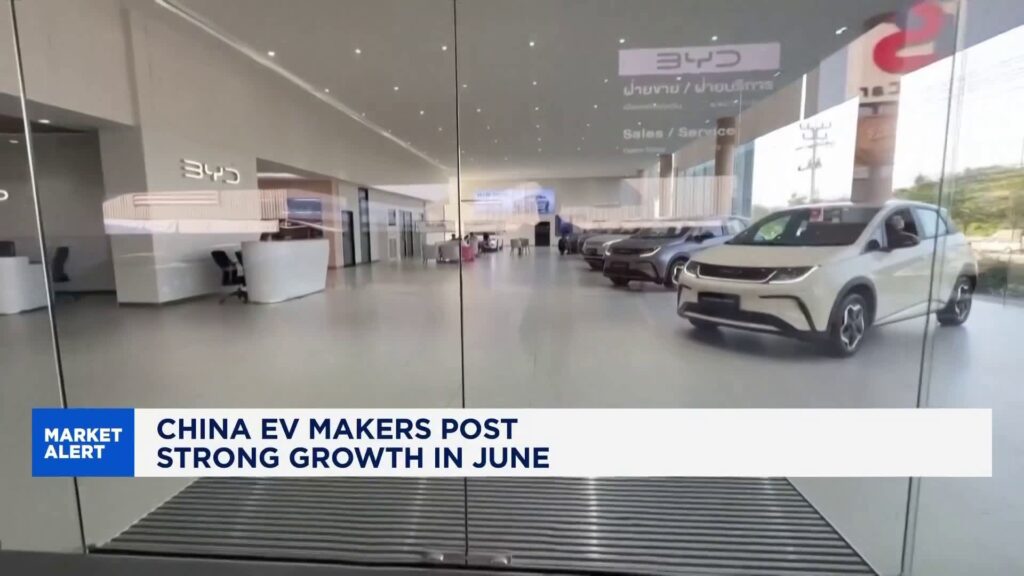As the electric vehicle (EV) market in China continues to expand at an unprecedented rate, Tesla finds itself facing stiff competition from local manufacturers. This surge in competition comes as Chinese companies ramp up production and innovation, aiming to capture a larger share of the world’s largest automotive market.
China’s EV market, already the largest globally, is projected to grow even further. According to the China Association of Automobile Manufacturers, EV sales are expected to reach 8 million units by 2025, a significant increase from the 3.5 million units sold in 2022. This rapid growth presents both opportunities and challenges for Tesla, which has been a dominant player in the market since establishing its Gigafactory in Shanghai.
Local Manufacturers Rising
Chinese automakers such as BYD, NIO, and Xpeng Motors are aggressively expanding their EV offerings, leveraging their deep understanding of the local market and consumer preferences. BYD, in particular, has emerged as a formidable competitor, recently surpassing Tesla in monthly sales within China.
BYD reported sales of 93,945 electric vehicles in September 2023, compared to Tesla’s 83,135 units during the same period.
This development follows a strategic push by these companies to not only increase production but also enhance the technological capabilities of their vehicles. Features such as advanced autonomous driving systems and improved battery efficiency are becoming standard, raising the bar for all competitors.
Government Policies and Incentives
The Chinese government’s policies have played a crucial role in fostering the growth of the EV sector. Generous subsidies, tax breaks, and incentives for both manufacturers and consumers have made electric vehicles more accessible and affordable. Additionally, the government’s commitment to reducing carbon emissions aligns with the global push towards sustainable transportation.
According to industry experts, these policies have created a conducive environment for local manufacturers to thrive. “China’s regulatory framework is designed to support the domestic EV industry, which has given local companies a significant advantage,” said Li Zhang, an automotive analyst based in Beijing.
Challenges for Tesla
While Tesla has enjoyed success in China, the increasing competition poses several challenges. The company must navigate not only the competitive landscape but also geopolitical tensions and supply chain disruptions. Additionally, Tesla’s reliance on imported components could be a vulnerability as local manufacturers continue to improve their supply chains and reduce costs.
Meanwhile, Tesla’s brand reputation, built on innovation and quality, remains a strong asset. However, maintaining its market share will require continuous investment in research and development, as well as strategic partnerships with local suppliers and technology firms.
Looking Forward
The move represents a pivotal moment for Tesla and the broader EV market in China. As competition intensifies, the landscape is likely to see further consolidation and strategic alliances. For consumers, this competition translates into more choices and potentially lower prices, as companies strive to offer the best value.
Industry observers suggest that the next few years will be critical for Tesla as it adapts to the evolving market dynamics. The company’s ability to innovate and respond to local consumer demands will be key determinants of its success in China.
In conclusion, while Tesla remains a significant player in China’s EV market, the rise of local manufacturers signals a new era of competition. The implications of this shift will not only impact Tesla but also influence the global automotive industry as a whole.
About The Author
 EU to Announce Ambitious 2040 Climate Target Amid Rising Heatwaves
EU to Announce Ambitious 2040 Climate Target Amid Rising Heatwaves Oasis Reunion Tour Ignites Cross-Generational Excitement Worldwide
Oasis Reunion Tour Ignites Cross-Generational Excitement Worldwide Blockdaemon Names Alex Zinder as Chief Product Officer to Drive Innovation
Blockdaemon Names Alex Zinder as Chief Product Officer to Drive Innovation JMGO Unveils PicoPlay Series: Portable Projectors for Streaming and Social Experiences
JMGO Unveils PicoPlay Series: Portable Projectors for Streaming and Social Experiences Tennessee Law Targets Teen Bullying by Suspending Driver’s Licenses
Tennessee Law Targets Teen Bullying by Suspending Driver’s Licenses